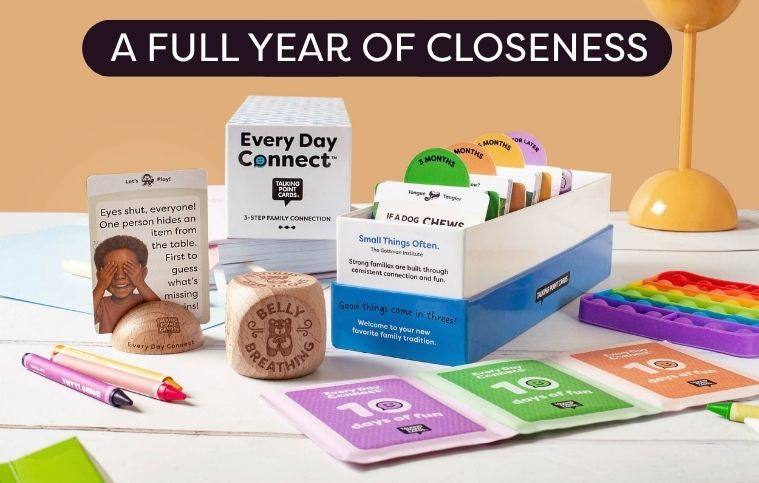SHOP
About
The Problem We All Pretend Doesn't Exist
The Day Everything Changed
The Magic Started with One Simple Question
When Stories Bridge the Impossible Gap
The Unexpected Wisdom Exchange
Breaking Down the "They Won't Understand" Barrier
The Ripple Effect
Why Traditional Family Conversations Fall Short
The Science Behind Why This Works
Creating Your Own Conversation Revolution
When Grandparents Become Real People
The Gift of Time
Beyond the Dinner Table
The Unexpected Joy of Being Known
Making It Sustainable
Your Family's Story Starts Now
Shop Family Products
Picture this: It's Thanksgiving dinner, and three generations are squeezed around your dining room table.
Grandpa's adjusting his hearing aid while scrolling through Facebook on his iPad (yes, he finally figured that out). Your teenage daughter is texting under the table, probably telling her friends how "boring" family dinner is. Your 8-year-old is asking if he can be excused to play video games, and honestly? You're secretly checking your work emails because the silence is getting weird.
Sound familiar?
This was us last year. Three generations of good people who genuinely loved each other, but somehow we'd lost the art of... well, talking. Really talking.
It's like we were all speaking different languages. Grandma wanted to share stories from "the good old days" (which, let's be honest, sometimes felt like lectures). The kids wanted to talk about YouTube videos and TikTok trends that made zero sense to anyone over 25.
And us adults? We were stuck in the middle, translating and mediating and feeling exhausted by it all.
The Problem We All Pretend Doesn't Exist
Here's what nobody talks about at those parenting blogs or family therapy articles: generational conversations are hard. Like, really hard.
It's not anyone's fault. Grandpa grew up in a world without smartphones, where you knew your neighbors and families ate dinner together every single night. Your kids are growing up in a world where their best friends might live in different time zones and they can learn anything from a YouTube tutorial.
And somewhere in the middle, we're all just... missing each other.
I started noticing it everywhere. At restaurants, I'd see families sitting together but everyone staring at their own screen. At the park, grandparents pushing swings while kids played silently. Even at birthday parties, the different age groups would naturally cluster together—adults with adults, kids with kids, grandparents with grandparents.
We were together but not really together, you know?
The saddest part? Everyone wanted to connect. I could see it in my dad's eyes when he'd try to start a story and get met with glazed expressions. I could see it in my kids' faces when they'd attempt to explain something they were excited about and get confused looks in return.
We were all reaching across this invisible divide, but somehow our hands weren't quite meeting.
The Day Everything Changed
So there we were again - another family dinner, another round of awkward small talk about the weather and work and school (in that order, always in that order).
My mom had made her famous pot roast. The table looked beautiful. Everyone showed up. And within twenty minutes, we were back to our usual pattern: polite conversation that felt more like a performance than actual connection.
That's when my sister-in-law pulled out this small box of cards.
"I found these online," she said, looking slightly embarrassed. "They're supposed to help families talk to each other. I thought... maybe we could try them?"
Honestly? My first thought was oh great, another gimmick. You know how it is—you try so many things to "fix" family dynamics that you become skeptical of anything that promises easy solutions.
But here's the thing about desperate times: they make you willing to try desperate measures.
The Magic Started with One Simple Question
The first card my nephew drew was: "What is the funniest family story you remember?"
I watched my 72-year-old father's face light up.
"Oh!" he said, actually leaning forward in his chair. "When your grandmother and I were newlyweds, she tried to make me a fancy dinner. She'd never cooked a whole chicken before, so she stuffed it with... everything. Literally everything in our tiny kitchen. Rice, leftover vegetables, even a banana because she thought it would add flavor."
My daughter started giggling. "A banana? In a chicken?"
"The chicken exploded in the oven," Dad continued, grinning. "There was banana-flavored stuffing everywhere. We ended up eating peanut butter sandwiches and laughing until we cried."
And just like that - just like that - we were off.
My mom shared her own cooking disasters. My son told us about the time he tried to "help" by washing the cat with dish soap. My teenager admitted to accidentally dying her hair green with a DIY recipe from Pinterest.
But here's what happened next that I didn't expect: the stories started connecting.
Dad's cooking story led to tales about their early marriage, which made my daughter curious about how they met, which sparked my son's questions about what life was like when they were young.
For the first time in years, nobody was checking their phone.
When Stories Bridge the Impossible Gap
Over the next hour, something beautiful unfolded.
My kids learned that their grandfather had been afraid of the dark until he was twelve (just like my youngest). My parents discovered that their grandchildren worry about many of the same things they did—making friends, fitting in, being good enough.
The conversation flowed in ways I'd forgotten were possible.
The next card asked: "Were there any fads during your youth you remember vividly?"
My dad's eyes got this distant, amused look. "Pet rocks," he said, shaking his head. "I actually bought your grandmother a pet rock for her birthday. She kept it on her nightstand for years, and we'd joke about feeding it and taking it for walks."
"Wait, what?" my son looked confused. "People bought rocks as pets?"
"It was a whole thing," Mom chimed in, laughing. "Everyone had them. We thought we were so sophisticated."
My daughter rolled her eyes in that way only teenagers can. "That's like... the TikTok dances we do now. You're going to think they're ridiculous in twenty years."
"I already think they're ridiculous," I muttered, which got everyone laughing.
But then something interesting happened. Dad started asking about current trends, genuinely curious about what kids were into these days. My daughter explained TikTok challenges (the safe ones, thankfully), and suddenly we were comparing fads across generations, realizing that every generation has their "thing" that seems silly to everyone else.
The questions weren't just conversation starters—they were story bridges.
The Unexpected Wisdom Exchange
You know what surprised me most? It wasn't just the grandparents sharing wisdom with the kids.
You know what surprised me most? It happened when we drew the card that asked: "Is there anything left on your bucket list?"
My dad got quiet for a moment. "You know," he said slowly, "I've always wondered about this internet thing. How it all works. I see you kids creating things online, and I feel like I'm missing out on something important."
My son's face absolutely lit up. "Grandpa, I can show you! I've been learning how to make websites, and there's this thing called coding that's like... giving instructions to computers."
"You mean people can just... tell computers what to do and they'll do it?" Dad asked, genuinely fascinated.
"Yeah! Want me to show you how to make a simple website? We could make one about our family!"
I watched my tech-averse father nod enthusiastically, and I almost cried right there at the dinner table.
Over the next hour, my 8-year-old became the teacher, patiently explaining HTML basics to his grandfather while my dad asked question after question, taking notes on a napkin. It was beautiful - this complete role reversal where the youngest was sharing knowledge with the oldest, and both were absolutely delighted by it.

Rated #1 Generations Product
Strengthen family bonds, spark fun and meaningful conversations, and create connection that lasts.

Breaking Down the "They Won't Understand" Barrier
Before this, conversations in our family operated on a lot of assumptions.
We assumed the kids wouldn't be interested in "old stories." We assumed the grandparents wouldn't understand modern problems. We assumed we needed to keep things simple, surface-level, safe.
But these questions - carefully crafted, thoughtfully designed - created a space where those assumptions melted away.
And they inspired my son to ask his own final question of the night: "What would you consider the most important inventions in your life?"
This question sparked the most incredible discussion. My dad talked about television—how his family gathered around their first TV set like it was a miracle. My mom mentioned the washing machine and how it changed everything for women in her generation.
"You kids don't realize," she said, "that before automatic washing machines, doing laundry took an entire day. It was backbreaking work."
My daughter shared how smartphones had changed her world—not just for entertainment, but for learning, connecting with friends, and even helping with anxiety through meditation apps.
My son, ever the practical one, said, "Air conditioning. Definitely air conditioning."
We all laughed, but then Dad got thoughtful. "You know what's interesting? Every generation thinks their inventions are the most important. But really, they all build on each other. Your smartphones wouldn't exist without the television technology I grew up with."
It was this beautiful moment of recognizing how each generation contributes to the next, how progress is really about building bridges between what was and what could be.
The Ripple Effect
That dinner was six months ago, and the change in our family dynamic has been incredible.
My kids now call their grandparents not just on birthdays but when they want to share something exciting. My parents text me photos not just of their meals but with questions like "Can you ask [grandson] to explain this TikTok to me?"
We've used the cards on road trips, during holiday visits, even over video calls when we can't be together in person. Each time, we discover something new about each other.
Last week, my dad asked if we could have another "card dinner" because he had more stories he wanted to share. My teenage daughter, who six months ago barely looked up from her phone during family time, actually said, "Yes! I love those dinners."
Why Traditional Family Conversations Fall Short
Here's what I've realized: most of our family conversations stay on the surface because we don't know how to go deeper without it feeling forced or awkward.
We ask "How was school?" and get "Fine."We ask "How was your day?" and get "Good."We share updates about work, weather, and weekend plans.
It's not that we don't want to connect - it's that we don't have the tools to bridge the gap between small talk and meaningful conversation.
The right questions change everything. They give permission to share. They create curiosity instead of judgment. They turn dinner table time into story time.
The Science Behind Why This Works
There's actually research behind why structured conversation prompts work so well for families, especially across generations.
When we ask open-ended questions that invite storytelling, several things happen:
Stories create emotional connections. When someone shares a personal story, it activates empathy in listeners. Suddenly, that "difficult teenager" becomes a person with fears and dreams. That "out-of-touch grandparent" becomes someone with fascinating experiences.
Questions level the playing field. Everyone has stories. Everyone has opinions. When the conversation is guided by thoughtful prompts, age differences become less important than shared human experiences.
Curiosity replaces judgment. Instead of making assumptions about what different generations think or feel, questions create space for discovery. You can't judge someone when you're genuinely curious about their answer.
Creating Your Own Conversation Revolution
You don't need a special occasion to start having better family conversations. In fact, the most magical moments often happen during ordinary times.
Try pulling out conversation starters during:
-
Car rides (especially longer ones)
-
Waiting for food at restaurants
-
Holiday gatherings
-
Video calls with distant family
-
Weekend mornings over coffee and cereal
-
Those in-between moments when everyone's just hanging around
The key is creating a space where everyone feels safe to share without fear of judgment or correction.
When Grandparents Become Real People
One of the most beautiful outcomes of our conversation experiment has been watching my kids see their grandparents as actual people with rich, complex lives.
Before, Grandma was just... Grandma. Someone who made cookies and sent birthday cards and occasionally told long stories about people they'd never met.
Now she's someone who once hitchhiked across the country with just a backpack.
Someone who was shy as a child but learned to speak up for herself. Someone who has fears and dreams and opinions about things that matter.
My kids don't just love their grandparents now - they actually like them. They're curious about them. They see them as people worth getting to know.
The Gift of Time
Here's something nobody prepared me for about parenting: how quickly the years pass, especially with older family members.
My dad is 72. My mom is 69. If I'm lucky, I have maybe 20 more years with them. My kids are growing up fast—in what feels like minutes, they'll be off creating their own lives.
These conversations aren't just about family bonding. They're about capturing stories before they're lost. They're about creating connections that will outlast the people who make them.
Every story my dad tells is a piece of family history. Every moment my kids spend really talking with their grandparents is a memory they'll carry forever.
I used to think I had plenty of time for "meaningful conversations later." Now I realize that later might not come. The time for these conversations is now, while everyone is still here, still present, still capable of sharing their stories.
Beyond the Dinner Table
The beautiful thing about learning to have better conversations is that the skills transfer everywhere.
My kids are now more comfortable talking to adults in general. They ask better questions. They listen more attentively. They've learned that everyone has interesting stories if you know how to ask.
My parents have become more curious about modern life instead of dismissive. They ask genuine questions about things they don't understand instead of making judgments.
And me? I've learned to slow down and really listen. To ask follow-up questions. To resist the urge to multitask during family time.
The Unexpected Joy of Being Known
There's something magical that happens when family members really see each other - not just as roles (mom, dad, grandparent, child) but as individuals with unique perspectives and experiences.
My daughter told me recently that she never knew her grandfather was funny until we started having these deeper conversations. My dad mentioned that he had no idea his grandchildren were such deep thinkers.
We'd been living beside each other without really knowing each other.
Now, family time feels richer. Even our quiet moments feel more connected because we have this foundation of understanding and genuine interest in each other's lives.
Making It Sustainable
The key to keeping these conversations going isn't perfection - it's consistency.
We don't have profound family discussions every day. Sometimes we still eat dinner while scrolling our phones. Sometimes the kids are grumpy, or the adults are tired, or everyone's just not in the mood for sharing.
But now we have tools. We know how to turn a boring car ride into story time. We know how to rescue an awkward family gathering. We know how to go beyond "How was your day?"
The change doesn't happen overnight, but it does happen. One conversation at a time. One story at a time. One moment of genuine connection at a time.
Your Family's Story Starts Now
Every family has a choice: you can keep having the same surface-level conversations, or you can decide to go deeper.
You can keep wondering what your teenager is really thinking, or you can ask questions that invite them to share.
You can keep assuming your parents "wouldn't understand" modern life, or you can create opportunities for real dialogue.
You can keep letting family gatherings feel like obligations, or you can turn them into celebrations of the unique, wonderful people you're related to.
The tools exist. The time is now. Your family's stories are waiting to be told.
The only question is: are you ready to listen?
----------
What story will your family tell next Sunday's dinner? What bridge will you build between the generations gathered around your table? The conversation—and the connection—is just one question away.
At Talking Point Cards, we believe that meaningful connection starts with simple, heartfelt conversations. Our collection of easy-to-use, engaging conversation starters helps families of all shapes and sizes put down their screens, lean in, and truly listen to one another - one question at a time. Because stronger families aren’t built in grand gestures - they’re built in everyday moments.
Let's Stay Connected
Love what you’re reading? There’s more where that came from. Get fresh ideas, inspiring tips, and simple ways to spark deeper conversations - delivered straight to your inbox. Because the best connections start here. Just pop in your email below to join us.
We respect your privacy. We’ll never share or sell your information. By subscribing, you agree to receive emails from us. Unsubscribe anytime.












